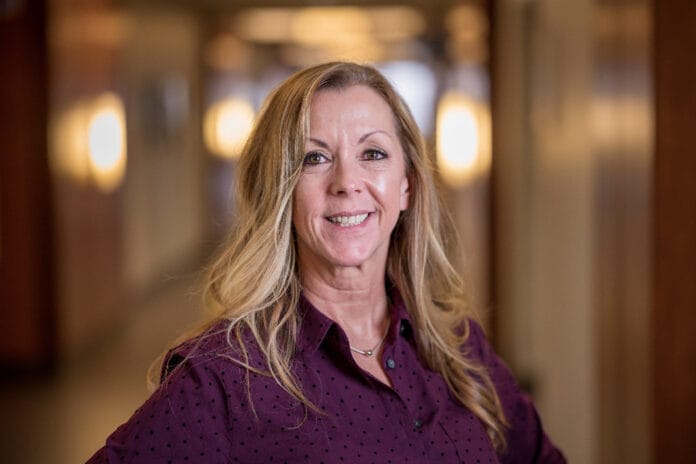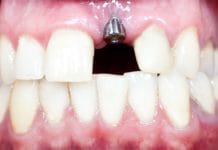Meet Kristeen, I mean to say, Dr. Kristeen Perry! She is not only a dental hygienist of 31 years but also a full-time dental hygiene faculty member, CDCA examiner, and doctorate program graduate.
Dr. Perry has been in the dental profession since 1987. Before entering dental hygiene school, she began her dental career as a dental assistant in general practice and then orthodontics. She continued working as a dental assistant and receptionist during hygiene school.
I recently had a chance to learn more about Dr. Perry’s dental career thus far.
Machado: What made you decide to become a dental hygienist? What is your why?
Perry: I began my dental career as a dental assistant in my early 20s. I was working at a dental office that treated individuals who were on state and federal-funded programs. Unfortunately, many of these patients, including children and adolescents, had poor oral health. They needed extensive treatments that were not covered and could not afford to pay out of pocket.
There was a lack of dental health education and preventive care within this population that I felt I somehow needed to help. Having this experience led me to my why. I decided to further my education and become a dental hygienist so I could help educate and care for individuals in need of preventive care and perhaps bridge a small piece of the dental inequities our underserved population experiences.
Machado: How long did you work as a clinical dental hygienist? Are there any patient cases in your career that stand out to you?
Perry: I practiced clinically for about 15 years. Although I changed practices a few times early in my career, I was fortunate to find a practice I stayed at for about 10 years. All of my patients were special to me. They became family.
Machado: Along with clinical hygiene and education, what other aspects of the field have you worked in?
Perry: I have been a CDCA/WREB/CITI examiner for about six years. Having been a second-year clinical coordinator, I wanted to learn more about the exam process. I was able to attend many of the annual meetings as an educator, which helped me learn more about the exam process and make connections to learn about becoming an examiner.
Machado: What are the qualifications or requirements needed to become an examiner?
Perry: An examiner needs to be a licensed dental hygienist or dentist with clinical experience. You do not have to be an educator to be an examiner.
CDCA/WREB/CITA provides training and calibration for all their examiners. As an examiner/grader, you attend calibration workshops and complete calibration exercises before each exam to ensure all examiners are calibrated and can pass the exam exercises at a minimum of 80%.
Machado: Have there been changes throughout the years in dental hygiene clinical exams? If so, what?
Perry: Oh yes! The pandemic certainly impacted the exam process. Not being able to hold a live patient exam led to the development of what is now called a Simulated Patient Clinical Treatment Exam (SPCTE). Many states have permanently adopted the SPCTE. And most states now accept the newly merged CDCA/WREB/CITI exam.
In terms of the process, the SPTCE still runs similarly to the Patient Treatment Clinical Examination (PTCE). One exam uses a manikin, and the other uses a live patient. However, the SPTCE has enabled the exam to become more standardized.
Students are now examined with the same type/amount of calculus (simulated) for removal and detection. Moreover, the SPTCE has eliminated the need for students to find a patient that meets the defined criteria. Many times, in a PTCE, students became desperate to find a patient and would select a patient that was too difficult or did not meet the criteria, which may impact their ability to be successful on the exam.
In addition, the SPTCE has also enabled students’ grades to be released much quicker than the PTCE.
Machado: What should readers know about examiners?
Perry: Our charge is to ensure the safety of the patient. We want candidates to be successful.
Author’s note: Switching gears a little bit. I love to learn about other educators and different dental hygiene programs. Kristeen is full-time faculty at Massachusetts College of Pharmacy and Health Sciences, one of Massachusetts’s seven dental hygiene schools. She is not only an educator; she was also a student recently earning her doctorate.
Machado: What courses do you teach?
Perry: I teach Pain Management Lab, Evidence-Based Dental Hygiene Practice, Dental Materials, and Dental Materials Lab.
Machado: Has your dental hygiene program implemented or incorporated anything new recently into clinic or didactic curriculum? If so, what?
Perry: Since the pandemic, so much has changed. We have incorporated extraoral suctions and air purifiers and changed our PPE protocols to include face shields, over gowns, and scrub caps.
Our curriculum is always under review, and we change things as needed according to our outcomes assessments.
Machado: What’s your favorite aspect of being a dental hygiene educator?
Perry: I truly enjoy watching students learn and having the ah-ha moment when it all comes together.
Machado: What is a common challenge you have observed recently for students?
Perry: This is a difficult question to answer. Each cohort presents with different challenges. Right now, I believe the biggest challenge is dealing with the effects of the COVID-19 pandemic.
Machado: Do you have any advice for dental hygiene educators? Students?
Perry: Being in education is extremely rewarding, but it is not an 8 to 5 job; it is ongoing. There is so much involved, such as preparing for courses, managing students and faculty, research, scholarship, and a host of other things. My advice for educators is that they need to have boundaries and set up a work-life balance at the beginning so the work does not consume them.
Dental hygiene is so much more than cleaning teeth. We are prevention specialists educated to treat and arrest disease. We are educated to help the public improve their oral and overall health using the knowledge we gained throughout our education. My advice for students is to ensure they are passionate about the career/profession they choose. This isn’t about money, although it can be beneficial. The choice in career needs to be about improving an individual’s oral health.
Machado: Where did you receive your doctorate, and what is your doctorate in? How long is the program?
Perry: I received my doctorate in health sciences from Massachusetts College of Pharmacy and Health Sciences in the fall of 2022. The program is three years long, taking two classes per semester.
Machado: What influenced you to return to school for your doctorate?
Perry: Like many other educators, I am a lifelong learner. Many of my colleagues also hold doctorate degrees or are enrolled in a doctoral program. We have great support from the university and our dean to continue our education.
Machado: Can you describe your doctorate program, such as course load, presentations, and thesis?
Perry: I took two courses per semester during the fall, spring, and summer. Since it was fully online, long nights and weekends were spent at the computer answering discussion board questions and creating presentations.
The final piece was a capstone project. I had written a thesis for my master’s program, so I decided I wanted to complete a capstone instead of a dissertation. A capstone project is the application of research to aid in quickly delivering a solution to an issue within a real-world setting.
A dissertation is similar to a thesis. It is a written piece of work that presents research findings that respond to a hypothesis with self-conducted research.
Both require research questions, literature reviews, methods, and analysis.
My capstone project focused on interprofessional education and collaborative practice and was titled “Dental Hygiene Students’ Knowledge, Perceptions, Attitudes, and Readiness for Interprofessional Education and Interprofessional Collaborative Practice.”
Machado: What was the most challenging aspect of this program?
Perry: Staying focused was hard. Working full-time teaching and then going home and putting in a few more hours of homework was difficult. It was also hard to miss family events or beach days because there was homework to do.
Machado: What was the most rewarding aspect of your program?
Perry: Receiving my degree! It is such a sense of accomplishment. I truly enjoyed interacting with other professionals from various health professions.
Machado: How are you implementing your doctorate in your field and job?
Perry: At the moment, I am still trying to figure that all out. I have enrolled in additional leadership courses to help me learn more about the administrative piece of education. Who knows what the future will hold, so I want to be as prepared as possible.
My goal is to hopefully take on a role as a program director or dean of a dental hygiene or allied health program. These leadership courses will help me develop the skills needed to prepare for these administrative roles.
Machado: What advice would you give someone interested in returning to school and continuing their education for additional degrees, including a doctorate?
Perry: Follow your dreams. If continuing your education is the smallest thought in your mind, do it. It is never too late!
Machado: Is there anything else you would like to share?
Perry: Remember to be true to yourself. This is your journey. Take your own road, and do the best you can, no matter what road you are on.
In Closing
Kristeen is a prime example of how dental hygienists are multi-talented. We wear many hats and, most of the time, more than one hat at a time. Although clinical dental hygiene is only one part of dentistry, a very important one at that, there are a lot of avenues we can turn to. Not only can you work chairside, but you can educate the next generation, be an examiner, work in administration, or as a sales representative or consultant, just to name a few.
A good first step is education. This may mean going back to school, but it may also mean doing your own research, working with a mentor, being certified in specific skills, adding additional licensure, or taking continuing education courses. There is always another door to open!
Before you leave, check out the Today’s RDH self-study CE courses. All courses are peer-reviewed and non-sponsored to focus solely on high-quality education. Click here now.












